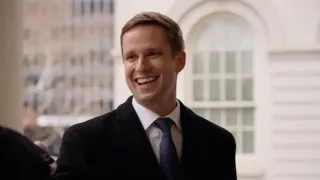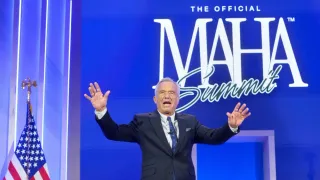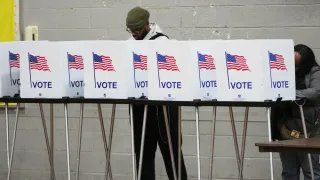August 25, 2019
Ex-Rep. Joe Walsh to Challenge Trump in 2020 GOP Primary
READ TIME: 3 MIN.
Joe Walsh, a former Illinois congressman ad tea party favorite turned radio talk show host, announced a longshot challenge Sunday to President Donald Trump for the Republican nomination in 2020, saying the incumbent is "completely unfit" for office and must be denied a second term.
"Somebody needs to step up and there needs to be an alternative" among Republicans, Walsh told ABC's "This Week," adding that "the country is sick of this guy's tantrum. He's a child. ... He lies every time he opens his mouth."
Already in the race is former Massachusetts Gov. Bill Weld.
Walsh narrowly won a House seat from suburban Chicago in the 2010 tea party wave but lost a 2012 reelection bid and has since hosted a radio talk show. He has a history of inflammatory statements regarding Muslims and others and declared just before the 2016 election that if Trump lost, "I'm grabbing my musket."
But he has since soured on Trump, criticizing the president in a recent New York Times column over growth of the federal deficit and calling him "a racial arsonist who encourages bigotry and xenophobia to rouse his base."
Walsh promises to contest Trump from the right as opposed to Weld, who is regarded as fiscally conservative but socially liberal. Weld was the 2016 Libertarian Party vice presidential nominee.
The road ahead for any Republican primary challenger will certainly be difficult.
In recent months, Trump's allies have taken over state parties that control primary elections in Iowa, New Hampshire, South Carolina and elsewhere. State party leaders sometimes pay lip service to the notion that they would welcome a primary challenger, as their state party rules usually require, but they are already working to ensure Trump's reelection.
South Carolina Republicans have gone so far as to discuss canceling their state's GOP primary altogether if a legitimate primary challenge emerges to eliminate the threat.
At the same time, polling consistently shows that Trump has the solid backing of an overwhelming majority of Republican voters. An Associated Press-NORC poll conducted this month found that 78% of Republicans approve of Trump's job performance. That number has been hovering around 80% even as repeated scandals have rocked his presidency.
"Look, this isn't easy to do. ... I'm opening up my life to tweets and attacks. Everything I've said and tweeted now, Trump's going to go after, and his bullies are going to go after," Walsh told ABC.
Asked whether he was prepared for that, Walsh replied: "Yes, I'm ready for it."
Walsh, 57, rode a wave of anti-President Barack Obama sentiment to a 300-vote victory over a Democratic incumbent in the 2010 election. He made a name for himself in Washington as a cable news fixture who was highly disparaging of Obama.
Walsh was criticized for saying that the Democratic Party's "game" is to make Latinos dependent on government just like "they got African Americans dependent upon government." At another point, he said radical Muslims are in the U.S. "trying to kill Americans every week," including in Chicago's suburbs.
He lost his 2012 reelection bid by more than 20,000 votes to Democrat Tammy Duckworth, who was elected to the U.S. Senate four years later.
Walsh told Obama to "watch out" on Twitter in July 2016 after five police officers were killed in Dallas. Just days before Trump's 2016 win over Hillary Clinton, Walsh tweeted: "On November 8th, I'm voting for Trump. On November 9th, if Trump loses, I'm grabbing my musket. You in?" Walsh later said on Twitter that he was referring to "acts of civil disobedience."
Walsh wrote in his New York Times column that "In Mr. Trump, I see the worst and ugliest iteration of views I expressed for the better part of a decade."
"On more than one occasion, I questioned Mr. Obama's truthfulness about his religion," Walsh wrote. "At times, I expressed hate for my political opponents. We now see where this can lead. There's no place in our politics for personal attacks like that, and I regret making them."
Walsh said his 2016 vote for Trump was actually against Clinton and faulted Trump for his unwillingness to confront Russian President Vladimir Putin.
"He encouraged Russian interference in the 2016 election, and he refuses to take foreign threats seriously as we enter the 2020 election. That's reckless," Walsh wrote. "For three years, he has been at war with our federal law enforcement and intelligence agencies, as he embraces tyrants abroad and embarrasses our allies. That's un-American."
___
Associated Press writers Tom Davies in Indianapolis and Steve Peoples in New York contributed to this report.






